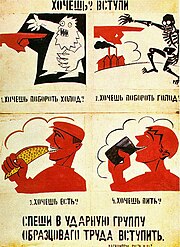Agitprop
From Wikipedia, the free encyclopedia

"1. You want to overcome cold?
2. You want to overcome hunger?
3. You want to eat?
4. You want to drink?
Hurry to enter shock brigades!"
Agitprop (Russian: агитпроп) is a portmanteau of agitation and propaganda.[1] The term originated in Bolshevist Russia (the future Soviet Union), where the term was a shortened form of отдел агитации и пропаганды (otdel agitatsii i propagandy), i.e., Department for Agitation and Propaganda, which was part of the Central and regional committees of the Communist Party of the Soviet Union. The department was later renamed Ideological Department.
The term propaganda in the Russian language didn't bear any negative connotation at that time. It simply meant "dissemination of ideas". In the case of agitprop, the ideas to be disseminated were those of communism, including explanations of the policy of the Communist Party and the Soviet state. In other contexts, propaganda could mean dissemination of any kind of beneficial knowledge, e.g., of new methods in agriculture. "Agitation" meant urging people to do what Soviet leaders expected them to do; again, at various levels. In other words, propaganda was supposed to act on the mind, while agitation acted on emotions, although both usually went together, thus giving rise to the cliché "propaganda and agitation".
The term "agitprop" gave rise to agitprop theatre, a highly-politicized leftist theatre originated in Europe of 1920s-1930s and spread to America as well, with plays of Bertolt Brecht being a notable example.[2] Gradually the term "agitprop" came to describe any kind of leftist politicized art.
In the western world, agitprop has a negative connotation. In the United Kingdom during the 1980s, for example, socialist elements of the political scene were often accused of using agitprop to convey an extreme left-wing message via television programmes or theatre.
After the Bolshevik Revolution, an agitprop train toured the country, with artists and actors performing simple plays and broadcasting propaganda. It had a printing press onboard the train to allow posters to be reproduced and thrown out of the windows if it passed through villages.[3]
[edit] See also
| Wikimedia Commons has media related to: Propaganda of the Soviet Union |
[edit] References
- ^ Definition by dictionary.com
- ^ Richard Bodek (1998) "Proletarian Performance in Weimar Berlin: Agitprop, Chorus, and Brecht", ISBN 1571131264
- ^ Paul A. Smith, On Political War, pg. 124, National Defense University Press, 1989
[edit] Further reading
- The Soviet Propaganda Machine, Martin Ebon, McGraw-Hill 1987, ISBN 0070188629
- Rusnock, K. A. (2003). "Agitprop". in Millar, James. Encyclopedia of Russian History. Gale Group, Inc. ISBN 0028656938. http://www.answers.com/topic/agitprop#Russian_History_Encyclopedia.

